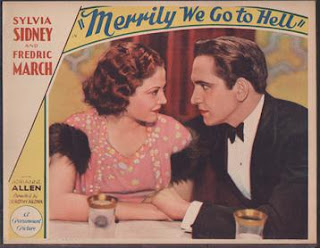Merrily We Go To Hell
I was looking for something to watch on the Criterion Channel and stumbled across Merrily We Go To Hell, a title I couldn't resist. It turned out to be pretty good. It starts as a romantic comedy and transitions to a dark drama about alcoholism. It was released in 1932 and directed by Dorothy Aznar, who was the only woman who directed Hollywood pictures during the twenties and thirties.
The film chronicles the relationship between Sylvia Sidney, a socialite and heiress, and Fredric March, a newspaper columnist and drunk. They meet at a party and he is already drunk, but she finds him funny and charming and sweet, while he is over the moon about her.
They plan to marry, despite protests from Sidney's stern father (George Irving). March nearly blows it by being too drunk to attend the engagement party, but he makes it to the wedding. They are happy, he's on the wagon, and has written a play he's trying to get produced. When he finally finds a producer, they go to New York and find out that the actress hired to play the lead is March's old flame.
This starts him drinking again, and he is unable to resist his old girlfriend's allure. It's a pre-Code film, so there is frank discussion of open marriage--Sidney says if he can see other people, so can she. They show up a party with other people--she with a very young Cary Grant.
She finally leaves him and goes back to her father. March tries to make amends and then learns she has had a baby. A poignant scene at the hospital, with the two reconciled, despite Irving's attempts keep them apart, ends the film.\
Merrily We Go To Hell (some newspapers wouldn't run ads because of the title, though the film did good go box office) is layered, with well-rounded characters. I was particularly impressed with March, who does play a lovable lush, so we can why Sidney is so forgiving. And she's so adorable it's no mystery why he's attracted to her. A fine film.
The film chronicles the relationship between Sylvia Sidney, a socialite and heiress, and Fredric March, a newspaper columnist and drunk. They meet at a party and he is already drunk, but she finds him funny and charming and sweet, while he is over the moon about her.
They plan to marry, despite protests from Sidney's stern father (George Irving). March nearly blows it by being too drunk to attend the engagement party, but he makes it to the wedding. They are happy, he's on the wagon, and has written a play he's trying to get produced. When he finally finds a producer, they go to New York and find out that the actress hired to play the lead is March's old flame.
This starts him drinking again, and he is unable to resist his old girlfriend's allure. It's a pre-Code film, so there is frank discussion of open marriage--Sidney says if he can see other people, so can she. They show up a party with other people--she with a very young Cary Grant.
She finally leaves him and goes back to her father. March tries to make amends and then learns she has had a baby. A poignant scene at the hospital, with the two reconciled, despite Irving's attempts keep them apart, ends the film.\
Merrily We Go To Hell (some newspapers wouldn't run ads because of the title, though the film did good go box office) is layered, with well-rounded characters. I was particularly impressed with March, who does play a lovable lush, so we can why Sidney is so forgiving. And she's so adorable it's no mystery why he's attracted to her. A fine film.



Comments
Post a Comment